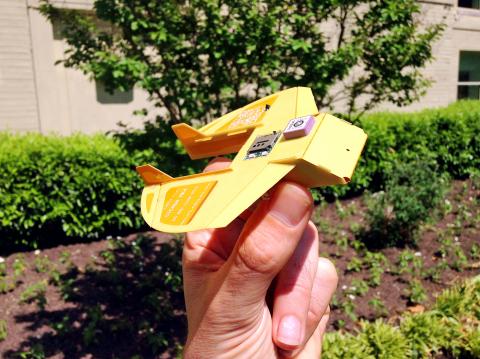US military scientists have invented a miniature drone that fits in the palm of a hand, ready to be dropped from the sky like a mobile phone with wings.
The “micro air vehicle” is named after the insect that inspired its invention, the cicada, which spends years underground before appearing in great swarms, reproducing and then dropping to the ground dead.
“The idea was: Why can’t we make UAVs [uncrewed aerial vehicles] that have the same sort of profile,” US Naval Research Laboratory flight controls engineer Aaron Kahn told reporters. “We will put so many out there, it will be impossible for the enemy to pick them all up.”

Photo: AFP
The “Cicada” — short for covert autonomous disposable aircraft — was designed to be smaller, cheaper and simpler than any other robotic aircraft, but still able to carry out a mission in a remote battlefield.
The prototype cost just US$1,000 and the cost could come down to as little as US$250 per unit, Kahn said.
With no motor and about 10 parts, the Cicada resembles a paper airplane with a circuit board.
It is designed to glide to programmed GPS coordinates after being dropped from an aircraft, a balloon or a larger drone, researchers said.
In a test about three years ago in Yuma, Arizona, Cicada drones were released from 17,500m. The drones flew — or fell — 18km, landing within 5m of their target.
The Cicada can fly at 74kph per hour and are virtually silent, with no engine or propulsion system.
“It looks like a bird flying down,” Naval Research Laboratory aerospace engineer Daniel Edwards said. “[However,] it’s very difficult to see.”
In the flight test, the Cicada had sensors that could send back readings for temperature, air pressure and humidity.
Researchers said the mini-drones could be used for a myriad of missions.
“They are robotic carrier pigeons. You tell them where to go and they will go there,” Edwards said.

Taiwan is gearing up to celebrate the New Year at events across the country, headlined by the annual countdown and Taipei 101 fireworks display at midnight. Many of the events are to be livesteamed online. See below for lineups and links: Taipei Taipei’s New Year’s Party 2026 is to begin at 7pm and run until 1am, with the theme “Sailing to the Future.” South Korean girl group KARA is headlining the concert at Taipei City Hall Plaza, with additional performances by Amber An (安心亞), Nick Chou (周湯豪), hip-hop trio Nine One One (玖壹壹), Bii (畢書盡), girl group Genblue (幻藍小熊) and more. The festivities are to

Auckland rang in 2026 with a downtown fireworks display launched from New Zealand’s tallest structure, Sky Tower, making it the first major city to greet the new year at a celebration dampened by rain, while crowds in Taipei braved the elements to watch Taipei 101’s display. South Pacific countries are the first to bid farewell to 2025. Clocks struck midnight in Auckland, with a population of 1.7 million, 18 hours before the famous ball was to drop in New York’s Times Square. The five-minute display involved 3,500 fireworks launched from the 240m Sky Tower. Smaller community events were canceled across New Zealand’s

‘IRRESPONSIBLE’: Beijing’s constant disruption of the ‘status quo’ in the Taiwan Strait has damaged peace, stability and security in the Indo-Pacific region, MOFA said The Presidential Office yesterday condemned China’s launch of another military drill around Taiwan, saying such actions are a “unilateral provocation” that destabilizes regional peace and stability. China should immediately stop the irresponsible and provocative actions, Presidential Office spokeswoman Karen Kuo (郭雅慧) said, after the Chinese People’s Liberation Army (PLA) yesterday announced the start of a new round of joint exercises around Taiwan by the army, navy and air force, which it said were approaching “from different directions.” Code-named “Justice Mission 2025,” the exercises would be conducted in the Taiwan Strait and in areas north, southwest, southeast and east of Taiwan

UNDER WAY: The contract for advanced sensor systems would be fulfilled in Florida, and is expected to be completed by June 2031, the Pentagon said Lockheed Martin has been given a contract involving foreign military sales to Taiwan to meet what Washington calls “an urgent operational need” of Taiwan’s air force, the Pentagon said on Wednesday. The contract has a ceiling value of US$328.5 million, with US$157.3 million in foreign military sales funds obligated at the time of award, the Pentagon said in a statement. “This contract provides for the procurement and delivery of 55 Infrared Search and Track Legion Enhanced Sensor Pods, processors, pod containers and processor containers required to meet the urgent operational need of the Taiwan air force,” it said. The contract’s work would be